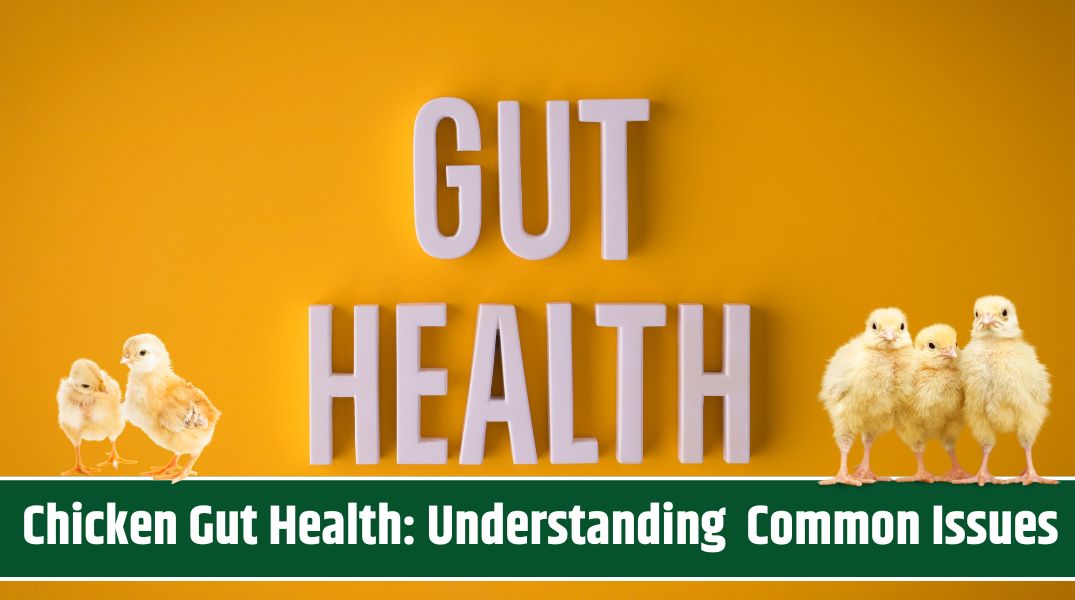Keeping backyard chickens healthy starts with proper diet and digestive care. Just like humans, chickens require a well-balanced diet to thrive, lay high-quality eggs, and maintain a strong immune system. Their gastrointestinal (GI) tract functions differently from ours, so understanding how it works can help prevent common digestive problems.
This guide covers the basics of a chicken’s digestive system, the best diet for different life stages, and how to prevent and manage common digestive issues.
Understanding the Chicken Digestive System
A chicken’s digestive tract has unique parts that work together to process food efficiently.
1. The Beak and Esophagus
- Chickens don’t have teeth, so they swallow food whole.
- Saliva helps moisten the food before it travels down the esophagus.
2. The Crop (Food Storage)
- The crop is a pouch that temporarily stores food and water.
- It starts the digestion process and holds food for about two hours before passing it to the stomach.
3. The Proventriculus and Ventriculus (Gizzard)
- The proventriculus is the chicken’s stomach, where food is broken down with digestive acids.
- The ventriculus (gizzard) is a muscular organ that grinds food, acting as a replacement for teeth.
4. The Intestines and Cloaca
- Nutrients are absorbed in the intestines.
- Waste (both solid and liquid) is expelled through the cloaca.
The Right Diet for Healthy Chickens
1. Choosing the Best Feed
Different chicken breeds and life stages require specific nutrients:
- Chicks (0-16 weeks) → High-protein chick starter feed.
- Laying Hens (16+ weeks) → Feed with higher calcium for strong eggshells.
- Broilers (meat birds) → High-energy, high-protein feed to promote growth.
2. Commercial Feeds vs. Homemade Diets
- Commercial feeds are scientifically balanced for different types of chickens and are available in mash, crumble, or pellet form.
- Mash: Soft and easy to digest.
- Crumble: Medium-sized, easier to eat.
- Pellets: Less waste, harder to scatter.
- Homemade feeds can be an option, but ensuring proper nutrient balance is challenging. Consult a poultry expert before mixing your own.
3. Treats and Scraps
- Treats should make up less than 10% of the diet.
- Too many scraps can disrupt nutrition and affect egg quality.
- Avoid junk food, high-fat treats, or excessive scratch grains.
Common Digestive Problems in Chickens
1. Fatty Liver Hemorrhagic Syndrome
- Caused by overconsumption of high-energy foods.
- Excess fat builds up in the liver, leading to ruptures and sudden death.
- Prevention: Avoid excessive treats and maintain a balanced diet.
2. Coccidiosis (Parasitic Infection)
- Caused by coccidia, a parasite that thrives in the intestines.
- Symptoms include diarrhea, weakness, weight loss, and anemia.
- Prevention:
- Feed medicated chick starter to boost immunity.
- Keep coop bedding clean and dry to reduce coccidia spread.
- Treatment: A veterinarian may prescribe coccidiostats if the infection is severe.
3. Roundworms (Internal Parasites)
- Long, white worms that live in the intestines.
- Symptoms: Weight loss, diarrhea, and lethargy.
- Birds get infected from wild birds, insects, or dirty environments.
- Prevention:
- Keep the coop clean and dry.
- Avoid unnecessary deworming, as mild infections help build immunity.
- Treatment:
- If worms are visible in droppings, consult a vet.
- Piperazine is the only approved dewormer for egg-laying hens.
4. Gastrointestinal Impactions (Blockages)
- Caused by chickens eating long, fibrous material or dry grains that expand in the stomach.
- Symptoms: Swollen crop, no appetite, and discomfort.
- Prevention:
- Provide grit to help grind food.
- Soak dry grains before feeding.
- Limit access to long grass, bread, or bedding material.
- Treatment:
- Mild cases: Provide laxatives (vegetable oil or soft foods).
- Severe cases: May require surgical intervention.
How to Keep Your Chickens’ Digestive System Healthy
- Feed a balanced diet with the right nutrients for their age.
- Limit treats and scraps to avoid obesity and digestive issues.
- Provide clean water at all times to aid digestion.
- Maintain good coop hygiene to prevent infections.
- Monitor droppings for signs of worms or diarrhea.
- Offer grit to help chickens break down food properly.
By following these simple steps, you can ensure healthy digestion and prevent common gastrointestinal diseases in your flock.
A chicken’s digestive health is key to its overall well-being and productivity. Providing the right diet, fresh water, clean housing, and proper parasite control will help keep your flock strong and disease-free. Regular monitoring and good management practices can prevent digestive problems before they start, ensuring happy, healthy chickens for years to come.
FAQ’s
1. How does a chicken’s digestive system work?
Chickens have a unique digestive system:
- Beak and Esophagus: Food is swallowed whole.
- Crop: Stores and softens food temporarily.
- Proventriculus and Gizzard: Food is digested with acids and ground up.
- Intestines and Cloaca: Nutrients are absorbed, and waste is expelled.
2. What type of feed should I give my chickens?
- Chicks (0–16 weeks): High-protein chick starter feed.
- Laying Hens (16+ weeks): Feed with extra calcium for strong eggshells.
- Broilers (meat birds): High-protein, energy-rich feed for fast growth.
3. Can I make homemade feed for my chickens?
Yes, but it’s challenging to balance nutrients. Commercial feeds are scientifically formulated to meet chickens’ needs. Consult a poultry expert before preparing homemade diets.
4. How much should treats and scraps make up of a chicken’s diet?
Treats and scraps should be no more than 10% of their diet to avoid nutritional imbalances. Avoid junk food, high-fat items, or excessive scratch grains.
5. What is fatty liver hemorrhagic syndrome, and how can I prevent it?
This condition occurs from overconsumption of high-energy foods, causing fat buildup in the liver. Prevent it by limiting treats and feeding a balanced diet.

















